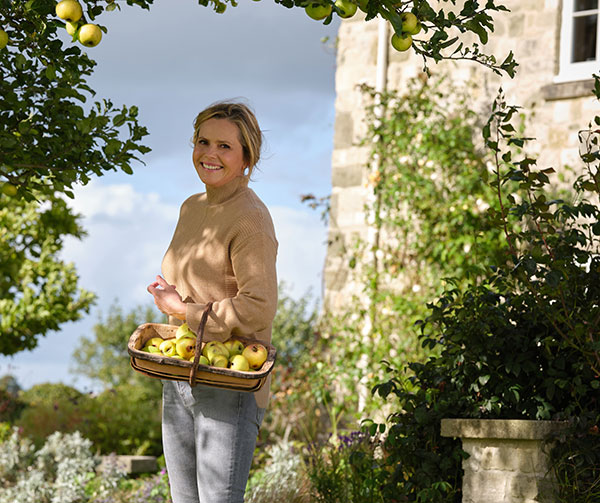Ethical entrepreneur, author and regenerative farmer Liz Earle has always been naturally inquisitive.
“I love asking tricky questions and I’m motivated by wanting to make life better by finding out how we can make things more sustainable for the next generation,” says Earle, who first started work as a journalist more than 30 years ago and is now busy growing her Liz Earle Wellbeing community and magazine, with a focus on nutritional health. “I do have a strong sense of injustice – I don’t like greenwashing, I like clarity and getting to the truth about something.”
Earle, who co-founded the eponymous skincare and beauty brand, firmly believes that how we look and feel depends on what we eat. Twelve years ago, she took her fascination with food and farming to the next level when she moved out of London to buy a 200-acre almost derelict farm in the West Country.
“I’m a long-term supporter of eating sustainably, growing and buying organic so this was a chance to walk the walk,” says Earle, who converted her farm to organic and “breathed new life into it”. With a flock of 300 sheep, a tenant farmer rearing cattle and her own organic egg production business, she now enjoys being firmly embedded in her local rural community.
“I really appreciate being able to get a glimpse of what it’s like to live and work on a working farm because you become so much more aware of the bigger picture – we’re surrounded by dairy farmers here and see the difficulties that they face,” she says.

Since selling the beauty business that still bears her name almost a decade ago, she has been delving into how what you put on the land ultimately affects health, by influencing hormones, immunity and the trillions of “good gut bugs” that live in human digestive systems.
“I have five children, I want to bring them up well, healthy, strong, fit and capable and we do that best by feeding them well,” says Earle, who in recent months says she has noticed a significant shift in attitude towards the real value of nutritious food. “The Covid-19 pandemic has given us all an opportunity to reconnect and appreciate farmers in a new way – it’s all very well running out of loo rolls, but we can’t live without basic foodstuffs.”
Earle insists that regenerative farming can sustain the world. “A huge part of the problem we face with global hunger is about distribution and waste, not actually production,” she says. “And with the modern advent of biopest control, for example, we do have sustainable ways to produce food more efficiently.”
Brexit is also a big opportunity to ensure that subsidies reflect what’s needed in agriculture, according to Earle: “Regenerative farming is very much about looking after the microbiome of the soil. It makes sense not to pollute the waterways with industrial fertilisers and nitrates and there are no actions without consequences. Instead of subsidising large scale arable farms producing toxic run-off, we need to make sure that the polluter pays.”
But the term ‘regenerative farming’ isn’t regulated. So, keen to find a rigorous standard, and with such a strong focus on the importance of soil health, Earle was one of the early adopters of the grass-fed Pasture for Life certification. “It all comes back to traceability and provenance. Being aware of labelling applies to foods just as much as cosmetics,” she explains.

Cosmetics as a sector has notoriously little regulation in terms of green claims, and back when she was running Liz Earle beauty, Earle says she used research from trusted sources, such as independent industry experts, rather than relying on corporate information.
“I like the scan codes on food so you can see where something is from, how it’s produced or whether it’s from one of Tesco’s fake farms. Blockchain technology will hopefully make it much easier to trace things back to source – perhaps one day in the future this might even call into question whether we need certification at all. It’s good to have regulation but it is expensive, time consuming and confusing with different criteria.”
Earle takes a holistic approach to the provenance of ingredients, whether that’s for skincare products, food or indeed precious metals. Her latest venture into ethical, Fairtrade jewellery is an extension of this philosophy. “Mining is a very dirty world in every sense – there are 25 million artisan miners in the world, mainly for gold, and that has a huge environmental impact,” she explains.
“Plus, the practice of dynamiting is polluting and toxic chemicals leach into the waterways. It’s such a precious commodity so there are added issues such as terrorism and slavery.”
On a mission to ensure that the precious silver and gold used in her jewellery would be as ethical as possible, she has gone to great lengths to meet the standards for Fairtrade, which she says is the only certification body for jewellery with an independent audit trail. “In business, we have opportunities to make positive change and then bring others along with us by shining a spotlight on areas needing clarity,” she concludes.
A Flatter, Happier Tum, how to improve your gut health by Liz Earle is out now.












Hi Liz
What are your views on veganism and health?
Do you think a plant based diet could be healthier than meat or fish based?
If your answer was ‘yes’, then how much more food could you produce from your acerage than you currently do?
Dear Liz
Well done you for waking the walk – I wish I could do the same!
Having read Wilding (Tree) and Feral (Monbiot), getting rid of the sheep would be a good move! They compact the soil, their dip is a pesticide (which we need to eradicate generally from our soils), and they eat everything down to the ground, depriving other wildlife of the biodiversity they need to survive. The UK needs to rid itself of this destructive (and non-native) species.